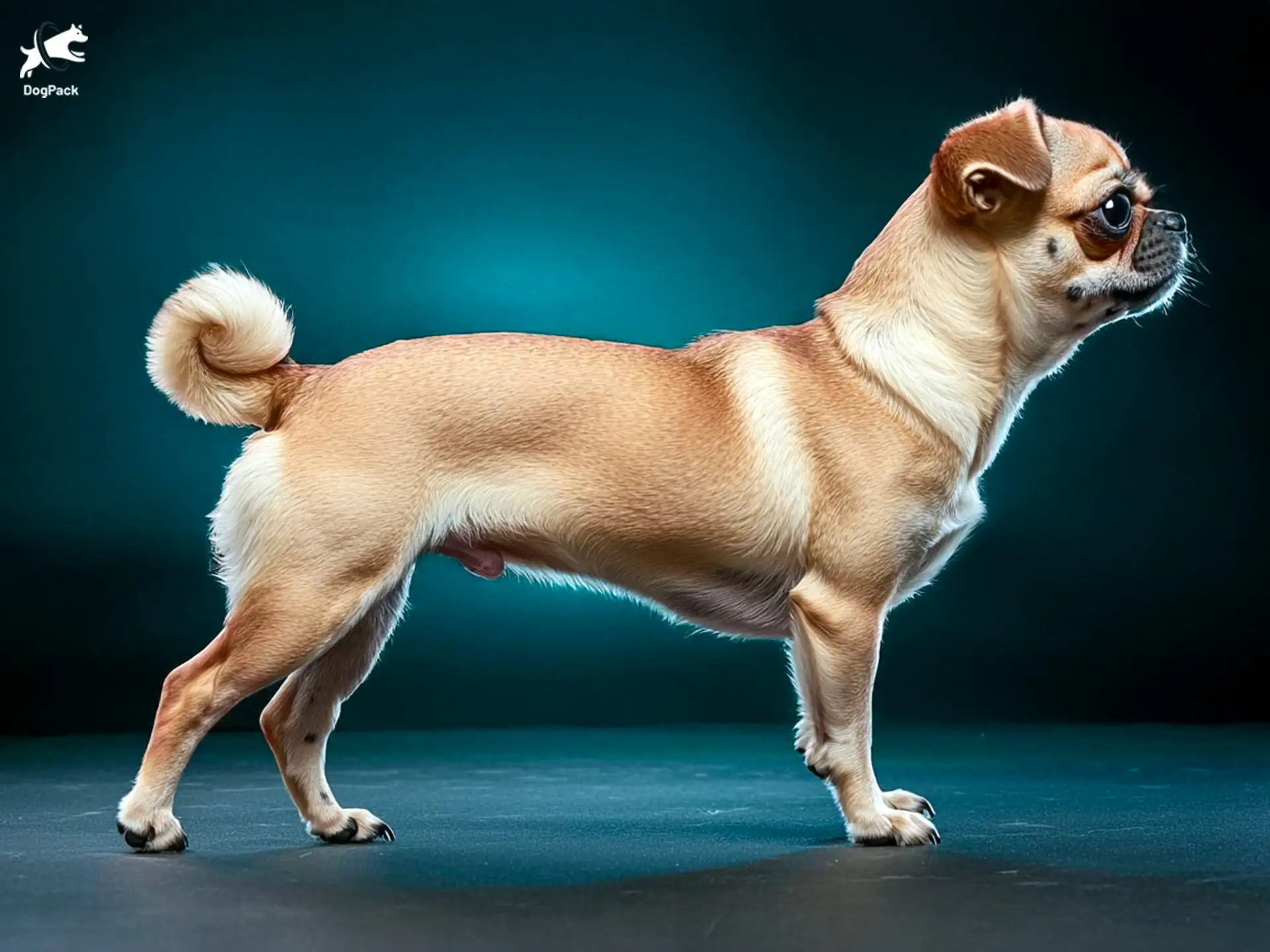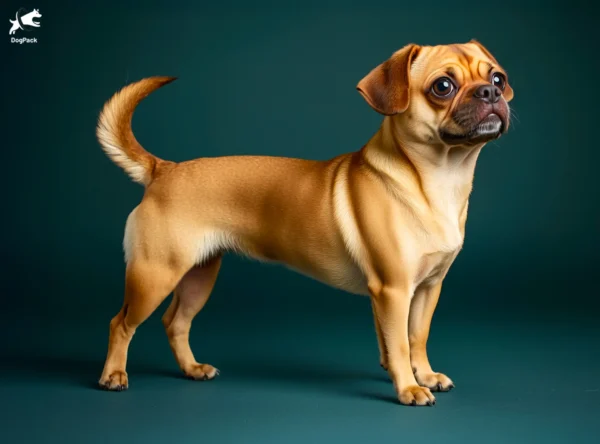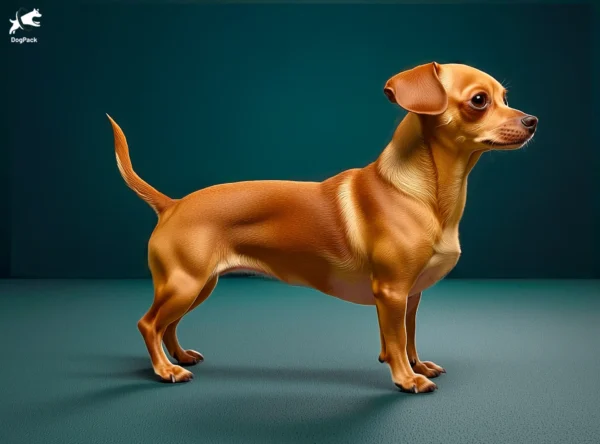Chug Dog Breed Info & Overview
The Chug, a delightful mix of the sassy Chihuahua and playful Pug, is a small dog with a big personality. Known for their affectionate nature and boundless energy, Chugs bring the best of both breeds into a compact, lovable package. With their charming antics and spirited personality, these hybrids are sure to capture your heart and make every day a little brighter.
Characteristics
Pictures
Breed History
The Chug is a relatively new hybrid that emerged in the early 2000s, blending the Chihuahua and the Pug to create an adorable companion. Breeders aimed to combine the Pug’s playful nature with the Chihuahua’s spirited personality. This mix quickly gained popularity among dog enthusiasts seeking a small yet lively pet.
While the Chug doesn’t have a long history, its parent breeds boast rich backgrounds. The Chihuahua hails from Mexico and is known for its feisty demeanor, whereas the Pug has ancient roots in China and was cherished by royalty. By merging these distinct lineages, the Chug inherits a blend of cultural heritage and traits.
Though not recognized by major kennel clubs due to its hybrid status, the Chug has captured the hearts of many. Its rise reflects a broader trend toward designer breeds that offer unique combinations of looks and temperaments. Today, Chugs are cherished family pets known for their affectionate and entertaining personalities.
Temperament, Personality
Chugs are known for their big personalities packed into a small body. They often inherit the Pug’s friendly and social nature, making them eager to meet new people. At the same time, they can display the Chihuahua’s boldness and sass, leading to a confident and sometimes headstrong demeanor.
These dogs are affectionate with their families and enjoy being the center of attention. They thrive on human interaction and may not appreciate being left alone for extended periods. Their playful antics and love for cuddles make them delightful companions who bring joy to any household.
Socialization from a young age helps ensure that a Chug gets along well with other pets and strangers. They may exhibit a bit of stubbornness during training, but their desire to please usually wins out. Overall, Chugs are loving, lively dogs that form strong bonds with their owners.
Physical Characteristics
The Chug typically inherits a mix of physical traits from both parent breeds. They often have the compact body and curled tail of a Pug, combined with the expressive eyes and erect ears of a Chihuahua. This unique blend results in a variety of appearances, making each Chug distinct.
Size-wise, Chugs are small dogs, standing between 6 and 12 inches tall and weighing anywhere from 10 to 20 pounds. Their coat can range from short and smooth to slightly longer, depending on which parent’s genes are more dominant. Common coat colors include fawn, brown, black, and tan.
One of the most endearing features of the Chug is their expressive face. They may have the Pug’s characteristic wrinkles and round face or the more pointed muzzle of the Chihuahua. Regardless of the specifics, Chugs are undeniably cute, turning heads wherever they go.
Health Issues
Like all breeds, Chugs can be prone to certain health issues inherited from their parent breeds. Respiratory problems may occur if they inherit the Pug’s brachycephalic (short-nosed) facial structure. This can lead to snoring or breathing difficulties, especially in hot or humid weather.
Dental issues are another concern, as small breeds like Chihuahuas often experience overcrowded teeth. Regular dental care is essential to prevent tartar buildup and gum disease. Eye problems such as dry eye or corneal ulcers can also affect Chugs due to their prominent eyes.
Maintaining a healthy weight is crucial to prevent obesity-related issues like joint problems or diabetes. Regular veterinary check-ups will help catch any potential health concerns early on. With proper care, a Chug can enjoy a happy and healthy life.
Grooming Needs
Chugs are relatively low-maintenance when it comes to grooming. Their coat is usually short and requires minimal brushing—once or twice a week should suffice to keep it looking its best. This helps remove loose hairs and distribute natural oils throughout the coat.
Bathing can be done as needed, typically every few months or when the dog becomes dirty. Be sure to use a gentle dog shampoo to protect their skin. If your Chug has facial wrinkles like a Pug, it’s important to clean and dry those areas to prevent irritation or infection.
Ears should be checked regularly for signs of infection or wax buildup. Due to their small size, Chugs may have dental overcrowding, so brushing their teeth several times a week is recommended. Nail trimming should also be part of the grooming routine to keep their paws healthy.
Exercise Requirements
Chugs have moderate energy levels and benefit from daily exercise to keep them happy and healthy. A couple of short walks each day, combined with some playtime, usually meets their activity needs. They enjoy interactive games like fetch or tug-of-war.
Despite being a small breed, Chugs can be surprisingly lively and may have bursts of zoomies around the house. Mental stimulation is also important; puzzle toys or training sessions can help keep their minds engaged and prevent boredom-related behaviors.
Keep in mind that extreme temperatures can be hard on Chugs, especially if they have a flat face like the Pug. Exercise should be adjusted during hot or cold weather to ensure their comfort. Always provide plenty of fresh water and watch for signs of overheating.
Training Tips
Training a Chug can be a fun experience, though they may exhibit a bit of stubbornness inherited from the Chihuahua side. Positive reinforcement methods work best—praise, treats, and play are great motivators for this breed. Consistency is key to helping them understand what’s expected.
Early socialization is important to ensure your Chug grows up to be a well-rounded dog. Expose them to different people, environments, and other animals to build confidence. Puppy classes can be a great way to combine socialization with basic obedience training.
House training may require patience, as small breeds sometimes take longer to grasp the concept. Keeping a regular schedule and rewarding successes will help. Avoid harsh corrections, as Chugs can be sensitive and may become fearful with negative training methods.
Nutrition, Diet
A balanced diet is essential for a Chug’s overall health. Due to their small size, they require high-quality dog food formulated for small breeds, which provides the necessary nutrients in appropriate portions. Overfeeding can lead to obesity, so it’s important to monitor their calorie intake.
Typically, a Chug will need about ½ to 1 cup of dry kibble per day, divided into two meals. The exact amount depends on factors like age, activity level, and metabolism. Consult with your veterinarian to determine the best feeding plan for your individual dog.
Some Chugs may be prone to food allergies or sensitivities. If you notice signs like itching, digestive upset, or ear infections, discuss dietary changes with your vet. Providing fresh water at all times is also important to keep your Chug hydrated and healthy.
Adoption, Breeders
If you’re considering adding a Chug to your family, adoption is a wonderful option. Many rescue organizations and shelters have Chugs or similar mixes looking for loving homes. Websites like Petfinder or groups like the Chug PuppiesFacebook Group can help you locate adoptable Chugs in your area.
Should you choose to go through a breeder, it’s crucial to find a reputable one who prioritizes the health and well-being of their dogs. Visit the breeder’s facility, meet the parent dogs, and ask about health screenings for common issues in Chihuahuas and Pugs.
Avoid purchasing from puppy mills or pet stores where the dogs’ welfare may be compromised. Responsible breeders and rescue organizations will be happy to answer your questions and ensure that a Chug is the right fit for your lifestyle.
Family Pet?
Chugs can make excellent family pets for households that understand their needs. They are affectionate and enjoy spending time with their human companions. Their playful nature can be a delight for older children who know how to handle small dogs gently.
Due to their size, supervision is recommended around young children to prevent accidental injuries. Chugs may also be wary of rough play, so teaching kids appropriate interactions is important. They can get along with other pets if properly socialized from a young age.
The Chug’s adaptability makes them suitable for apartment living or homes with limited space. They thrive in environments where they receive plenty of attention and aren’t left alone for long periods. Overall, they can be a charming addition to the right family.
Right For You?
Deciding if a Chug is right for you involves considering your lifestyle and expectations. If you’re looking for a small, affectionate companion who enjoys both playtime and lap time, the Chug might be a perfect match. They suit individuals or families who can provide the attention they crave.
Chugs are adaptable but do require regular exercise and mental stimulation. Potential owners should be prepared for some training challenges due to their occasional stubborn streak. Their moderate grooming needs and small size make them relatively easy to care for.
If you have the time and commitment to meet their needs, a Chug can bring a lot of joy and laughter into your life. Their unique blend of traits from two beloved breeds makes them a delightful companion for the right person.
Conclusion
The Chug is a charming hybrid that combines the best qualities of the Chihuahua and the Pug. With their affectionate nature and playful spirit, they make wonderful companions for those willing to invest time and love into their care. If you’re seeking a small dog with a big heart, the Chug might just be the perfect addition to your family.
FAQs
-
Do Chugs bark a lot?
Chugs may bark to alert their owners or express excitement, but excessive barking isn’t typically a major issue. Early training and socialization can help manage any tendencies to bark unnecessarily, making them suitable for apartment living.
-
Are Chug dogs hypoallergenic?
No, Chugs are not considered hypoallergenic. They tend to shed moderately due to their short coats, which can trigger allergies in sensitive individuals. Regular grooming can help reduce shedding, but they may not be ideal for those with severe allergies.
-
How big does a full-grown Chug get?
A full-grown Chug typically weighs between 10 and 20 pounds and stands about 6 to 12 inches tall. Their small size makes them suitable for smaller living spaces, but they still require regular exercise to stay healthy.
-
Do Chug dogs get along with cats?
Chugs can get along with cats if introduced properly and socialized from a young age. Their friendly and playful nature often allows them to coexist peacefully with feline companions, though individual temperaments can vary.
-
How much does a Chug puppy cost?
The cost of a Chug puppy can vary widely, typically ranging from $500 to $1,000 depending on the breeder, location, and lineage. Always ensure you’re purchasing from a reputable breeder who prioritizes health and ethical practices.
Breed Ratings
Chugs are reasonably smart but may inherit some stubbornness, which can make training a bit challenging.
This breed loves to play and can be quite entertaining with their antics, making them fun companions.
With moderate energy, Chugs enjoy daily activities but are also content to relax with their owners.
Chugs shed a moderate amount; regular brushing can help manage loose hairs around the home.
They generally have a low prey drive but may occasionally chase small animals out of curiosity.
Their short coat requires minimal grooming, making them relatively easy to care for.
Training can be moderately easy with patience and positive reinforcement, despite occasional stubbornness.
Chugs prefer company and may become anxious if left alone for long periods.
They may bark to alert or express themselves but aren’t typically excessive barkers.
Drooling is minimal in Chugs, making them suitable for owners who prefer a tidier pet.
With proper socialization, Chugs can get along well with other dogs, though temperaments vary.
Chugs can be prone to certain health issues but are generally healthy with proper care.














